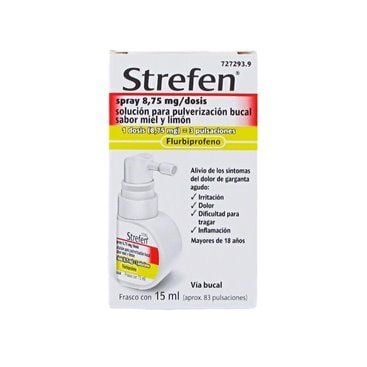Strefen Spray 8.75 Mg/Dose Solution For Mouth Spraying 15 Ml (Honey And Lemon Flavor)
Strefen Spray is used for the relief of acute sore throat symptoms such as irritation, pain, difficulty swallowing and inflammation in adults aged 18 years and over.
Strefen Spray is used for the relief of acute sore throat symptoms such as irritation, pain, difficulty swallowing and inflammation in adults aged 18 years and over.
Strefen Spray (8.75 Mg/Dose Solution For Mouth Spray 1 Bottle 15 Ml (Honey And Lemon Flavor))
ACTION AND MECHANISM
Non-steroidal anti-inflammatory (NSAID) belonging to the group of arylpropionics, which acts by preventing the synthesis of prostaglandins, through competitive and reversible inhibition of cyclooxygenase activity, an enzyme that converts arachidonic acid into prostaglandins.
INDICATIONS
- Short-term symptomatic relief of [SORE THROAT].
POSOLOGY
"MOUTH SPRAY DOSAGE"
- Adults: 1 application of 3 sprays in the back of the throat, every 3-6 hours as needed. Maximum dose 5 applications/24 h.
- Children and adolescents < 18 years: not recommended.
- Elderly: clinical experience is very limited and does not allow specific dosage recommendations to be established.
Duration of treatment : maximum 3 days.
DOSAGE IN RENAL FAILURE
- Mild to moderate renal insufficiency (CrCl 30-90 ml/min): no dose adjustment is required.
- Severe renal failure (CrCl < 30 ml/min): contraindicated.
DOSAGE IN LIVER FAILURE
- Mild to moderate hepatic impairment (Child-Pugh classes A and B): no dose adjustment required.
- Severe hepatic impairment (Child-Pugh class C): contraindicated.
CONTRAINDICATIONS
- Known hypersensitivity to flurbiprofen or [NSAID ALLERGY].
- Patients with a history of hypersensitivity to acetylsalicylic acid or other NSAIDs, which include patients who have experienced asthma attacks, acute rhinitis, urticaria or angioneurotic edema after using acetylsalicylic acid or other NSAIDs.
- [DIGESTIVE BLEEDING], [PEPTIC ULCERA] active.
- Severe renal failure (CrCl < 30 ml/min).
- Severe hepatic impairment (Child-Pugh class C).
- [HEART FAILURE] severe.
- Third trimester of pregnancy.
PRECAUTIONS
- [RENAL INSUFFICIENCY]. Contraindicated use in severe renal failure. NSAIDs could lead to decreased renal blood flow with reversible acute renal failure due to inhibition of vasodilator prostaglandin synthesis, and cases of nephrotic syndrome and acute interstitial nephritis have even been described with prolonged treatments. Patients with the highest risk of renal failure are those with previous renal failure, the elderly, or situations that could reduce renal flow, such as [HYPOVOLEMIA], [DEHYDRATION], low-sodium diets, [HEART FAILURE], liver failure, [LIVER CIRRHOSIS] or treatment with diuretics, ACE inhibitors or ARAII. In high-risk patients, during prolonged treatments, it is recommended to determine renal functionality (serum creatinine, CLcr) before starting treatment, and periodically. In case of worsening renal function, a dose reduction may be necessary.
- [LIVER FAILURE]. The use in severe insufficiency is contraindicated.
- Gastrointestinal toxicity. Treatment with NSAIDs has resulted in gastroduodenal ulcers, as well as life-threatening bleeding and perforation. There is a greater risk of ulcer with treatments with high doses or for long periods of time, with a history of peptic ulcer, especially if they have already had bleeding or gastrointestinal perforation due to NSAIDs, as well as in [SMOKING], [CHRONIC ALCOHOLISM] or elderly patients or weakened. However, short-term treatment is not without risk either.
As a general rule to reduce gastric damage, it is advisable to administer any NSAID with food. In addition, in risk groups it is advisable to start treatment with the lowest possible dose, and always associate an anti-ulcer drug (anti H2 or PPI) whenever possible.
High-risk patients should be closely monitored, as well as those who are being treated with drugs that may favor or aggravate gastrointestinal bleeding, such as oral anticoagulants, antiplatelet agents, corticosteroids or SSRIs. If a peptic ulcer or gastrointestinal bleeding appears, treatment will be discontinued. On the other hand, it should be used with caution in people with [INFLAMATORY BOWEL DISEASE], where NSAIDs could precipitate a crisis.
- Cardiovascular diseases. NSAIDs could lead to fluid retention and edema, which could increase blood pressure and worsen the symptoms of patients with cardiovascular diseases. It is recommended to individually evaluate the benefit/risk ratio in patients with [ARTERIAL HYPERTENSION], [HEART FAILURE], [ISCHEMIC HEART DISEASE], [CEREBRAL ISCHEMIA], [Stroke] or [PERIPHERAL ARTERIOPATHY], as well as in patients with cardiovascular risk factors , such as [DYSLIPEMIA], [DIABETES] or [SMOKING]. NSAIDs should always be used at the lowest effective dose and for the shortest period of time.
- Hepatic effects. Patients with [HEPATIC FAILURE] could see increased plasma levels. In addition, due to its high binding to plasma proteins, its free plasma levels could be increased, as has been verified in the case of [HEPATIC CIRRHOSIS].
On the other hand, the use of NSAIDs has sometimes been related to the appearance of liver symptoms, such as increased transaminases, [JAUNDICE] and [HEPATITIS], which could be serious and even fatal. Due to the risk of toxicity, it is recommended that patients with liver disease use this medication at the lowest effective dose, and periodically check liver function (transaminases, bilirubin) to detect any signs of liver damage. Its use is contraindicated in severe liver failure (Child-Pugh class C) as there are no data on its safety.
- Skin reactions. The use of NSAIDs has caused very rare, but potentially fatal, serious adverse reactions such as exfoliative dermatitis, toxic epidermal necrolysis, or Stevens-Johnson syndrome. These adverse reactions usually have an early onset, in the first month of treatment. If symptoms of hypersensitivity, mucosal lesions or skin erythema are observed, treatment will be discontinued.
- [HYPERSENSITIVITY REACTIONS]. The administration of any NSAID has been related to the appearance of allergic reactions. Cases of cross-hypersensitivity have been reported between different NSAIDs, as well as between NSAIDs and salicylates, so patients with a history of [ALLERGY TO NSAIDs] other than this active ingredient or [ALLERGY TO SALICYLATES] should use this active ingredient with extreme caution. .
It is recommended to avoid its use in those patients in whom a salicylate or an NSAID has previously given rise to severe allergic reactions, including [ASTHMA], [NASAL POLYPS], [ANGIOEDEMA] or [RHINITIS], due to the increased risk of life-threatening anaphylaxis.
- [ASTHMA]. Asthmatic patients are more likely to experience bronchospasm when taking an NSAID. In addition, they could be more susceptible to anaphylactic symptoms after the administration of an NSAID.
- [ALTERATIONS OF COAGULATION]. NSAIDs have antiplatelet activity, although less than that of acetylsalicylic acid.
- [ASEPTIC MENINGITIS]. Rare cases of aseptic meningitis have been reported in patients with NSAIDs, with fever and coma, probably due to a hypersensitivity reaction, although cross-allergy between NSAIDs has not been found. This meningitis seems to be more frequent in patients with [COLLAGENOSIS] such as [SYSTEMIC LUPUS ERYTHEMATOSO], although it has also been reported in some patients who did not suffer from these pathologies. In NSAID-treated patients who develop symptoms of meningitis, the possibility of aseptic meningitis should be considered.
- Ophthalmological pictures. NSAIDs have been related to the appearance of ocular reactions, such as blurred vision, loss of vision, alteration in color vision, scotoma or retinal alterations.
- [FEMALE INFERTILITY]: Like other NSAIDs, it can decrease female fertility and its use is not recommended in women who wish to become pregnant. In women who have difficulties conceiving or being studied for infertility, the withdrawal of the NSAID should be considered.
INTERACTIONS
- NSAIDs, including antiplatelet doses of acetylsalicylic acid. Increases the risk of peptic ulcer and gastric bleeding.
-Aliskiren. Possible reduction of the antihypertensive effect of aliskiren (NSAIDs act on the renin-angiotensin system). In patients with compromised renal function (dehydrated or elderly) deterioration of renal function may be precipitated (possible acute renal failure, usually reversible). Caution, especially in the elderly, monitoring the antihypertensive effect and renal function.
- SSRI antidepressants (fluoxetine, paroxetine, sertraline, citalopram). There is an increased risk of bleeding in general, and gastrointestinal bleeding in particular, especially in the elderly and patients with a history of gastrointestinal bleeding.
- Diuretics. Fflurbiprofen could oppose the diuretic and antihypertensive effects. Periodic blood pressure assessment is recommended.
- Glitazones (pioglitazone, rosiglitazone). Theoretical risk of potentiation of edema that both glitazones and NSAIDs can cause. Caution and monitor possible signs of fluid retention and heart failure (swollen ankles, dyspnea).
- Antiplatelet agents, including pentoxifylline: there is an increased risk of bleeding in general, and gastrointestinal bleeding in particular. Manage with caution.
- Potassium supplements: possible increase in potassium levels, with risk of hyperkalemia.
PREGNANCY
FDA category B, in the 3rd quarter FDA category D. There are no adequate and well-controlled studies in humans. Occasional use, except shortly before delivery, does not appear to produce adverse fetal effects. However, with chronic use during the 3rd trimester, they could theoretically cause premature closure of the fetal ductus arteriosus, by inhibiting prostaglandin synthesis. They can also produce an antiplatelet effect, which could complicate or prolong maternal bleeding and predispose the newborn. Before delivery, they can reduce and even cancel uterine contractility, delaying delivery and prolonging pregnancy. The use of these drugs, especially during the third trimester, is only accepted in the absence of safer therapeutic alternatives.
LACTATION
Concentrations of flurbiprofen in milk have been detected below 0.7% of maternal serum. It is very unlikely that the amount excreted has a negative impact on the nursing infant. However, caution is advised when using in lactating mothers.
CHILDREN
Safety and efficacy in children or adolescents under 18 years of age have not been established.
The use of oral spray in children and adolescents <18 years is not recommended.
SENIORS
The elderly are at greater risk of suffering serious consequences from adverse reactions. If the administration of an NSAID is considered necessary, the minimum effective dose should be administered for the shortest time necessary. The patient should be regularly monitored for gastrointestinal bleeding during treatment.
ADVERSE REACTIONS
The following adverse reactions are related to the short-term use of flurbiprofen at non-prescription doses.
- Blood: (<0.1%): [ANEMIA]. (<0.01%): hematopoietic disorders, ([HEMOLYTIC ANEMIA], [APLASTIC ANEMIA], [NEUTROPENIA], [THROMBOCYTOPENIA], [AGRANULOCYTOSIS]). The first signs are: fever, sore throat, superficial mouth ulcers, flu-like symptoms, severe tiredness, unexplained bruising and bleeding.
- Nervous system: (<1%): [HEADACHE] and [DIZZENESS]. (0.1-0.01%): [INSOMNIA]
- Respiratory: (0.1-0.01%): [DYSPNEA]. Exacerbation of [ASTHMA] and [BRONCHIAL SPASM].
- Gastrointestinal: (>10%): Oral discomfort (burning or itching sensation in the mouth). (1-10%): [ABDOMINAL PAIN], [DIARRHEA], [DRY MOUTH], [MOUTH ULCER], [NAUSEA] and oral paresthesia. (<1%): [DYSPEPSIA], [FLATULENCE] and vomiting. (0.1-0.01%): [GASTRIC PERFORATION] and [GASTRIC ULCER] or [DUODENAL ULCER].
- Renal and urinary: (<0.1%): [INTERSTITIAL NEPHRITIS], [NEPHROTIC SYNDROME] and renal failure.
ADVERSE REACTIONS RELATING TO EXCIPIENTS
- Because it contains methyl parahydroxybenzoate, it can cause [ALLERGY TO PARABENS], possibly delayed.
- Because it contains propyl parahydroxybenzoate, it can cause [ALLERGY TO PARABENS], possibly delayed.
OVERDOSE
- Symptoms : the symptoms of overdose are unknown, similar drugs have produced gastrointestinal disorders (vomiting, anorexia, abdominal pain), neurological (drowsiness, dizziness, disorientation, headache).
- Measures to be taken : Aspiration and gastric lavage, administration of adsorbent charcoal, alkalinization of urine, monitoring and maintenance of vital signs, symptomatic treatment of gastrointestinal irritation, hypotension, respiratory depression and convulsions, with monitoring of renal and hepatic functions and detection of feces. of possible gastrointestinal bleeding.
Strefen Spray Leaflet 8.75 Mg/Dose Solution For Mouth Spray 15 Ml (Honey And Lemon Flavor)



